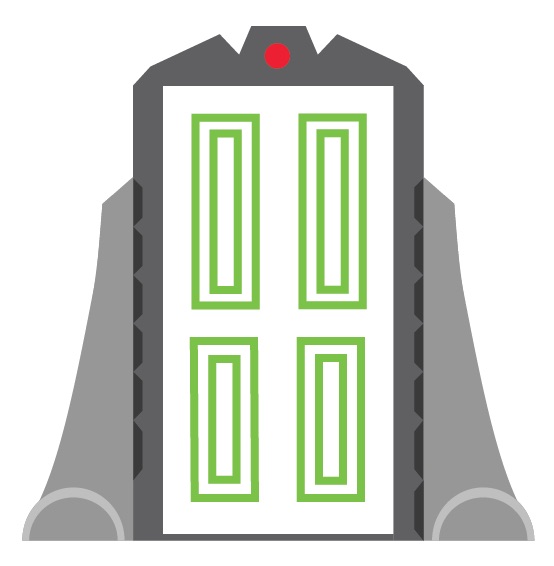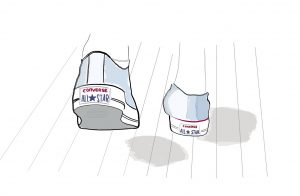When I was a kid, I used to rewatch Monsters, Inc. all the time, enough that I wore out the family VHS tape. Do you remember that scene when one monster comes out of his door with a sock on his back, and the Scare Floor erupts in chaos? If you really think back, you may also remember there is a quick cutaway to a counter that says “Accident Free for ___ Days.” After this incident, the number ticks from 47 down to zero. As a kid, I’m sure I found that hilarious. Now, though, I realize I have one of these signs in my own head. Only this sign isn’t for a “23-19.”
My sign measures how many days it has been since my anxiety has been so overwhelming that I don’t know what to do. As I write this piece, my counter sits at six days. This isn’t counting my everyday feelings of anxiety, which turn my stomach into something between an Irish dancing competition and a butterfly house.
I was 16 when I first truly encountered anxiety. The second semester of my junior year had just begun, but due to illness, I was forced to miss about a month of school. When I got back, I wanted to put that month behind me and move forward, but I soon found that I could not.
I had never been very nervous before, even when going into a test. Now I always felt anxious, a troubling side effect of the medication I was taking to improve my medical condition. I couldn’t breathe, couldn’t focus, couldn’t do anything. I did miserably on my first few exams after getting back, but once my dosages started to decrease, I began to figure my way out and my grades made a full recovery. Unfortunately, I can’t say the same for my mental state.
My ability to manage my anxiety only got more complicated when I came to Georgetown. Classes operated at level 11. The social scene was difficult to figure out. After attending a small, all-boys high school, I felt unprepared for the sheer intensity of the college experience. I was trying to make friends and join clubs while simultaneously choosing to stay in my dorm room when I didn’t have the mental strength to socialize.
Throughout those first few months, I talked myself into a pattern of not voicing my problems. I reasoned that my friends from back home were living their own lives now, and my friends here were people I’d only just met, so I couldn’t justify burdening them. And I figured my parents were worried about me enough, since I’m 3,000 miles away from them, and I didn’t want to worry them even more by detailing every time I felt anxious.
There have been times when I’ve told friends I couldn’t hang out because I had too much work. When they ask what I’ve been doing all day, I can’t tell them I laid on my bed for over two hours, doing absolutely nothing because I couldn’t function. Better to just let them think I’m lazy. I tell them I procrastinated and put the work off, silly old me.
I like to think I do a good job of putting up walls to ensure no one notices what is bubbling under the surface. I just tell another joke. Take on another responsibility. Keep smiling. When I do let my cheery exterior fall, and cracks appear on my normally smiling face, people tell me not to worry and that I’m just stressed. But I’m not just stressed. I feel like I’m living in an Eminem song: My “palms are sweaty, knees weak, arms are heavy.” I feel like I am twisting my stomach up into a little ball to try to hide the anxiety away so I can deal with the problem at a later date.
It’s often the small things that trigger my anxiety. The reminder of a due date or a messy room. Moments that may seem small to you are gigantic for me. You don’t care that I made a situation awkward. I do, and now I think you will look at me differently. You have already forgiven me for saying something unkind. However, it will be a long time until I forgive myself. These triggers cause my anxiety to crop up, occasionally to startling degrees. There are times when it hits so hard that I want to cry. I want someone to understand me and help me. I feel alone. But am I?
According to the Anxiety and Depression Association of America, “anxiety disorders are the most common mental illness in the U.S., affecting 40 million adults in the United States age 18 and older, or 18.1% of the population every year.” I know there are people on this campus who feel the same things I do. However, they’re hard to find because they are just as skilled at putting on a mask as I am. I have begun to realize, however, that hiding is no longer the right path.
I clearly remember reading that blowing on your thumb reduces anxiety, one of the many home brews I found on the internet. I was stoked to try it until I realized it wasn’t helping, and the person sitting across from me in class was probably wondering why this weird dude kept blowing on his thumb like it was chicken noodle soup. So I threw out that option and decided to finally start talking to a therapist.
I want to be able to do everything on my own, without needing others. However, I’m glad I decided to see a therapist because he has given me techniques that help bring me back to Earth. It was because of him that I discovered that by simply plugging in earbuds, tuning out the world, and focusing on breathing, I could feel so much better. Even with these new methods, though, I still felt like I needed something more.
I recently told my roommate and a few of my close friends about my anxiety. This may have been the best decision I could have made. Simply knowing about my anxiety doesn’t mean they can stop the feelings. But they can help me get through the rough patches and continue to focus on the road ahead.
Do you remember what happened to the monster with the sock on his back on the Scare Floor? He was jumped by the Child Detection Agency, shaved, and had a cone stuck on his head. All of his friends turned on him and ran away, and I was worried the same would happen to me when my counter got to zero. What I’m realizing now, though, is that this shouldn’t have been in my head. The more people I’ve told about my anxiety, the more support I have been given. People know when my sign has reached zero, but they don’t seem to care. They only care about me.
I know these feelings won’t ever really go away. But I’ve found a way to make living with them more manageable. I’ve started bringing other people in. I’m just talking about it. Simple as that.






